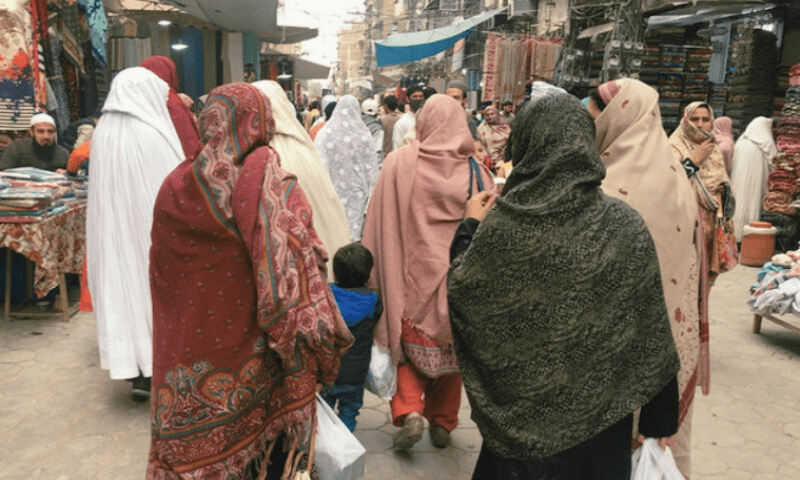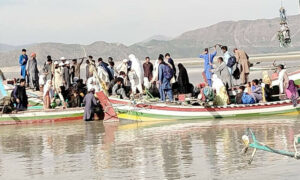In the Pashtun culture, women are still largely segregated into the domestic sphere because of constraining gender roles. But things are changing, slowly and subtly.
In the Bandagai village of Khyber Pakhtunkhwa’s Dir district, the usual, perhaps monotonous, morning routine was broken by a hawker’s cry. “Walay tuki walay (buy fabrics),” echoed through the narrow lanes and sets off a flurry of activity.
Women in Bandagai very much awaited this call in the late 1990s and early 2000s. It broke through their usual, perhaps monotonous, daily routine — sweeping the dusty kutcha home, cooking meals, scrubbing pots, cutting fodder for animals, making dung cakes or helping the men in farming chores. The women would pause and quickly wipe their hands on dupattas, their minds turning instead to the fresh fabric: its patterns, textures, and colours, something new and beautiful they had yet to touch.
Some would hurry into their rooms with footsteps light as thieves. They would kneel before their trunks, lift the lids, and rummage through the jumble of clothes for their savings: a few crumpled rupee notes wrapped in an old handkerchief, possibly tucked away from the prying eyes of their younger sons, whose frequent demands for pocket money would often drain them.
The money was hard-earned and even harder to come by. Some came from sewing clothes for neighbours, selling ghee, chickens, and a goat or sheep. A father or husband, the primary provider, who had a bit more spare cash, also slipped a few rupees into the woman’s hands. This was an occasional generosity in families on a tight budget.
As the hawker would get closer, the barking of the dogs would rise louder and more insistent: “Grrr! Woof-woof!” His call of “buy fabrics” would blend with the barks and threatening growls, creating a cacophony that could wake even the laziest member of the family, who would be dozing on a charpoy in the winter sun and listening to the radio.
Of course, this was a clamorous welcome, but I guess the hawker had gotten used to it, as he would not flinch away. Here is one such episode of the arrival of such hawkers in Bandagai.
Open for business
His face was tanned and wrinkled, likely from the years of trudging from village to village in the sun. But there was quite a glow about him. His finely embroidered white topi and the grey strands in his beard shimmered in the sunlight like silver threads catching the light. A bundle of fabrics slung over his shoulder, its weight making him stoop slightly. With each hurried step, the bundle swayed gently, mimicking the surrounding wheat fields rustling in the breeze. “Go tell your mother,” he called out to the children playing hopscotch in the dirt. “I’ve brought new clothes — cheap and beautiful (khaista!).”
And so, a fleeting open-air market was set up, where the space subtly got gendered. The norms of purdah — seclusion and modesty — crept into the scene as stealthily as a jackal sneaked into our barn under the cover of night and snatched our chickens (It evaded my father’s rifle, which he always kept oiled, wrapped in cloth and laid ready for such occasions.).
The hawker sat at a respectful distance from the home. Soon, the older women — the Abai or Babbo, often mothers or grandmothers — came out to meet him. Their old age, and maybe familiarity with him over time, had given them some sort of exemption from the purdah system. They were perhaps seen as, to some extent, “degendered” because of their age.
If Babbo was absent, children became messengers for younger women. They carried fabrics in their delicate hands and scuttled between home and hawker. But this arrangement sometimes left women a bit anxious. What if men, who were mostly not home during the day, returned and objected to this exchange? Would they disapprove of the hawker’s presence near their home? Such thoughts may have been running through their minds.
Anyway, it was mostly Babbo who was the first to meet the hawker when he began to undo his bundle. The knot sometimes resisted, like a stubborn shoelace, but it yielded after a few twists and tugs, creating a small explosion of neatly folded and squarely organised colourful fabrics.
The hawker displayed them with great flourish. His hand movements were as theatrical as the slow-motion replay of a fallen wicket in a cricket match. “Just arrived,” he claimed in a cajoling voice. “The house over there,” he pointed towards a house on a mound, “bought almost everything. Only a few left!”
Unfazed by the man’s show-off, Babbo leaned in, her eyes darting from fabric to fabric, a hunter spotting prey. She was a seasoned customer, shrewd and calculated, getting the right thing for the right price.
Meanwhile, young women sometimes craned their necks inside the home and peeped through doors to glimpse the scene. Their fingers itched to touch the fabric as soon as they could. When Babbo carried a few samples to them for scrutiny, they held a piece, felt its texture, judged its weight, and imagined how it would look stitched into a shalwar kameez. But choosing was far from simple. Ideally, it had to be different, not something their friends or relatives had bought. And, of course, there was always the question of money.
The haggling
Thus, the bargaining game began, a battle of trust and doubt. The hawker started with a high price and gradually marked it down as the negotiation continued.
“How much is this one?” Babbo asked casually. The hawker gave his asking price. “I’ll give you that much,” an unimpressed Babbo countered. “I swear, that’s even less than I paid for it,” the hawker grimaced and raised his voice. A flurry of offers and counteroffers flew back and forth.
“Take it or go,” Babbo warned in a tone that was firm enough to silence the chattering children gathered around. The hawker shook his head, adjusted the slightly slipped topi on his head, and dropped the price.
It was often Babbo’s victory. But she was not yet done. She smoothed the folded notes with her palms and, with her lips moving silently, counted them twice, thrice, just to be sure that no single note was missing.
For some women, payment was not so simple. They did not have enough cash. So, the balance was settled later or paid in kind, sometimes with chickens or a goat promised to be sold and paid for later. The credit and barter systems based on trust were very much alive.
For others, the hawker’s visit spurred anxiety and stress. They would run their fingers over the fabric, living a life they desperately want in their minds before returning it to the hawker. “Next time,” the women would say, more so to themselves. Perhaps, tomorrow would be slightly brighter when their chickens, goats or sheep grow fatter. Maybe then, they would have enough to buy.
The hawker, disappointed but empathetic, packed up his bundle and swung it over his shoulder. The weight of his unsold fabrics was not light, but no matter how many doors closed, his steps did not falter. Off he went to the next door, as he had done for decades, with his sing-song call: “Walay tuki walay.”
Stepping into the world of men
The scene described above was the lived experience for hundreds of women for as long as they can remember. In recent years, however, the tuki wala is fast becoming a relic of the past. No longer do the lanes echo with his booming voice. It’s not like he’s missed very much either.
Over the last decade or so, many women in Bandagai have begun to outgrow hawkers. They have been replaced by shopping spaces that are not just spacious, but also give women the agency to make purchases of their choice.
The first women’s shopping market was set up in the early 2000s near the graveyard in the Timergara Bazar. And, to no surprise, it wasn’t very well received by men, who dubbed it ‘Dozakh Market’ — an accusation and warning; a hotbed of evil influences, a descent into damnation. The space was seen as a place where women’s modesty and the masculinity of men who allowed them to go there were called into question.
These ominous remarks, however, did not hinder the growth of shopping spaces. Today, even small bazaars like Shamsi Khan house rows of shops specialising in women’s clothing and other commodities.
The proliferation of non-custom-paid, or kabuli, vehicles in Dir has made access to bazaars much easier. Some women have become small-scale entrepreneurs, selling women’s clothing from their homes, though still with the help of men.
Still, the marketplace is largely a world of men. Shops and malls cluster in specific areas of bazaars, and gendered displays differentiate their exteriors. On their plate-glass windows, women’s clothing is displayed to pull in women shoppers.
For women in Dir, a shopping trip is often a family excursion, typically chaperoned by a male — sometimes a son, other times a not-so-eager husband. But recently, region has seen a pleasant break from tradition — women shopping on their own.
Today, it is not uncommon to see college and university girls, with their purses clutched in their hands, roaming independently through the market without a male escort. At times, they venture to the bazaars in groups of female friends and feel somewhat more free to make choices that their grandmothers and mothers did not have.
I have noticed that this younger generation of women has even changed how purdah was once observed. Instead of a heavy burqa, they choose to wear something lighter and more flexible, the paronay — a chador or a long flowing dupatta. It is pulled around the head, body, and face while leaving the eyes and sometimes a bit of the face visible. This change shows that women renegotiate purdah gently, but surely.
Women’s wants have also grown more elaborate, and shopping has become a sensory experience for them. They take their time in the market browsing and inspecting garments by touch before deciding.
Though I occasionally hear extravagant spending stories where “spendthrift” is mentioned with little thought, shopping is mainly about needs. Women do not return from the bazaar carrying armfuls of shopping bags. They still rely on men’s wallets — mostly stuffed by the remittances from the Gulf States, which tighten when the labour market conditions change there — but their opportunities to consume are certainly more.
I recall a chat with Babbo, who has seen so much of the past. Comparing her past consumption habits with today’s women, Babbo told me, “Today’s women have so many clothes that their trunks are bursting, and they still keep buying more.”
She also saw women’s spending habits as money burning a hole in their pockets. Of course, she has a point. In her time, women could not even buy what they needed. And their possessions were very few. Now, there is no denying that times have changed.
Women today have greater access to clothing and a wider variety of commodities. And they have more choices when crafting a distinct feminine identity. But I would like to leave their femininity work — fashion choices, makeup and beauty products — to a female anthropologist, someone better suited to engage closely with women and tell us its nuances.
More choices and agency?
In Pukhtun society, women are still largely segregated into the domestic sphere because of constraining gender roles. But changes in their mobility outside the home, however small and subtle, have gradually taken root.
They have happened in stay-at-home women’s lives in a small village where the separation between home and public life was once much stricter — unlike the somewhat more relaxed gender segregation in big Pukhtun cities like Peshawar.
Women tread cautiously, their gazes lowered, and their movements measured, but they are in the bazaar now. There, they are more visible, asserting their presence, making choices, bargaining, buying and claiming a space in the male-defined sphere of the market.
In doing so, they are changing the male-centred character of the bazaar. And the men’s world around them has slowly begun to make room for them as they are increasingly accepted there. I now see something new: women have more choices and agency in a male-dominated Pukhtun society and are more active in the production and consumption of their identities.
The younger generation of women is pushing this change even further. More and more girls, with their backpacks slung over their shoulders, leave their homes each morning for school and university. They envision a future beyond the kitchen, the yard, the walls and the farms. They have begun stepping into the assumed masculine territories by taking up jobs in schools, hospitals, and beyond. Through paid employment, they gain purchasing power. And with it comes something greater: a voice, a choice, and an emerging sense of agency.
Thus, the sort of rigid gender order of Pukhtun society is becoming more open to subversion, and the sharp divide between domestic and public is getting less pronounced.
Header image: Women walk past Shafi Market in Peshawar, Khyber Pakhtunkhwa. — AN photo











